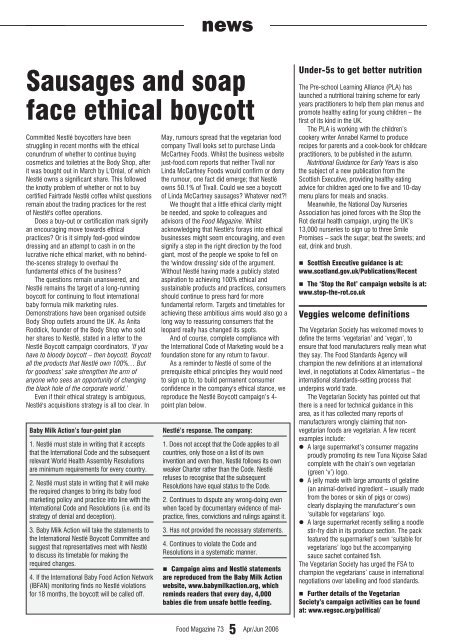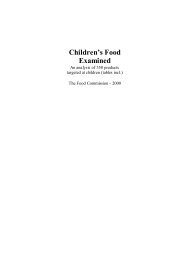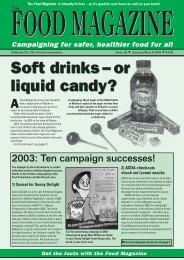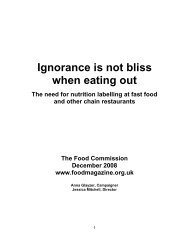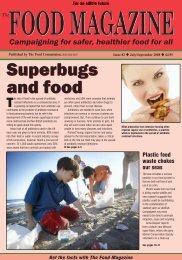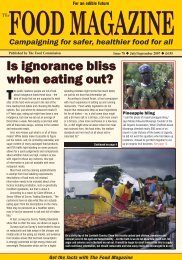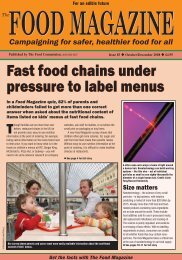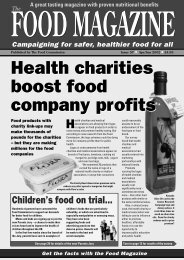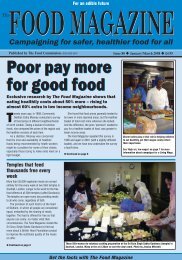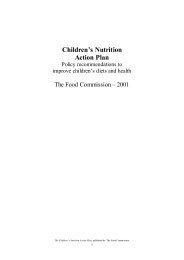Campaigning for safer, healthier food for all - The Food Commission
Campaigning for safer, healthier food for all - The Food Commission
Campaigning for safer, healthier food for all - The Food Commission
Create successful ePaper yourself
Turn your PDF publications into a flip-book with our unique Google optimized e-Paper software.
news<br />
Sausages and soap<br />
face ethical boycott<br />
Committed Nestlé boycotters have been<br />
struggling in recent months with the ethical<br />
conundrum of whether to continue buying<br />
cosmetics and toiletries at the Body Shop, after<br />
it was bought out in March by L'Oréal, of which<br />
Nestlé owns a significant share. This followed<br />
the knotty problem of whether or not to buy<br />
certified Fairtrade Nestlé coffee whilst questions<br />
remain about the trading practices <strong>for</strong> the rest<br />
of Nestlé's coffee operations.<br />
Does a buy-out or certification mark signify<br />
an encouraging move towards ethical<br />
practices? Or is it simply feel-good window<br />
dressing and an attempt to cash in on the<br />
lucrative niche ethical market, with no behindthe-scenes<br />
strategy to overhaul the<br />
fundamental ethics of the business?<br />
<strong>The</strong> questions remain unanswered, and<br />
Nestlé remains the target of a long-running<br />
boycott <strong>for</strong> continuing to flout international<br />
baby <strong>for</strong>mula milk marketing rules.<br />
Demonstrations have been organised outside<br />
Body Shop outlets around the UK. As Anita<br />
Roddick, founder of the Body Shop who sold<br />
her shares to Nestlé, stated in a letter to the<br />
Nestlé Boycott campaign coordinators, ‘If you<br />
have to bloody boycott – then boycott. Boycott<br />
<strong>all</strong> the products that Nestlé own 100%… But<br />
<strong>for</strong> goodness’ sake strengthen the arm of<br />
anyone who sees an opportunity of changing<br />
the black hole of the corporate world.’<br />
Even if their ethical strategy is ambiguous,<br />
Nestlé's acquisitions strategy is <strong>all</strong> too clear. In<br />
Baby Milk Action’s four-point plan<br />
1. Nestlé must state in writing that it accepts<br />
that the International Code and the subsequent<br />
relevant World Health Assembly Resolutions<br />
are minimum requirements <strong>for</strong> every country.<br />
2. Nestlé must state in writing that it will make<br />
the required changes to bring its baby <strong>food</strong><br />
marketing policy and practice into line with the<br />
International Code and Resolutions (i.e. end its<br />
strategy of denial and deception).<br />
3. Baby Milk Action will take the statements to<br />
the International Nestlé Boycott Committee and<br />
suggest that representatives meet with Nestlé<br />
to discuss its timetable <strong>for</strong> making the<br />
required changes.<br />
4. If the International Baby <strong>Food</strong> Action Network<br />
(IBFAN) monitoring finds no Nestlé violations<br />
<strong>for</strong> 18 months, the boycott will be c<strong>all</strong>ed off.<br />
May, rumours spread that the vegetarian <strong>food</strong><br />
company Tiv<strong>all</strong> looks set to purchase Linda<br />
McCartney <strong>Food</strong>s. Whilst the business website<br />
just-<strong>food</strong>.com reports that neither Tiv<strong>all</strong> nor<br />
Linda McCartney <strong>Food</strong>s would confirm or deny<br />
the rumour, one fact did emerge; that Nestlé<br />
owns 50.1% of Tiv<strong>all</strong>. Could we see a boycott<br />
of Linda McCartney sausages? Whatever next?!<br />
We thought that a little ethical clarity might<br />
be needed, and spoke to colleagues and<br />
advisors of the <strong>Food</strong> Magazine. Whilst<br />
acknowledging that Nestlé's <strong>for</strong>ays into ethical<br />
businesses might seem encouraging, and even<br />
signify a step in the right direction by the <strong>food</strong><br />
giant, most of the people we spoke to fell on<br />
the 'window dressing' side of the argument.<br />
Without Nestlé having made a publicly stated<br />
aspiration to achieving 100% ethical and<br />
sustainable products and practices, consumers<br />
should continue to press hard <strong>for</strong> more<br />
fundamental re<strong>for</strong>m. Targets and timetables <strong>for</strong><br />
achieving these ambitious aims would also go a<br />
long way to reassuring consumers that the<br />
leopard re<strong>all</strong>y has changed its spots.<br />
And of course, complete compliance with<br />
the International Code of Marketing would be a<br />
foundation stone <strong>for</strong> any return to favour.<br />
As a reminder to Nestlé of some of the<br />
prerequisite ethical principles they would need<br />
to sign up to, to build permanent consumer<br />
confidence in the company's ethical stance, we<br />
reproduce the Nestlé Boycott campaign’s 4-<br />
point plan below.<br />
Nestlé’s response. <strong>The</strong> company:<br />
1. Does not accept that the Code applies to <strong>all</strong><br />
countries, only those on a list of its own<br />
invention and even then, Nestlé follows its own<br />
weaker Charter rather than the Code. Nestlé<br />
refuses to recognise that the subsequent<br />
Resolutions have equal status to the Code.<br />
2. Continues to dispute any wrong-doing even<br />
when faced by documentary evidence of malpractice,<br />
fines, convictions and rulings against it.<br />
3. Has not provided the necessary statements.<br />
4. Continues to violate the Code and<br />
Resolutions in a systematic manner.<br />
Campaign aims and Nestlé statements<br />
are reproduced from the Baby Milk Action<br />
website, www.babymilkaction.org, which<br />
reminds readers that every day, 4,000<br />
babies die from unsafe bottle feeding.<br />
<strong>Food</strong> Magazine 73 5<br />
Apr/Jun 2006<br />
Under-5s<br />
to get better nutrition<br />
<strong>The</strong> Pre-school Learning Alliance (PLA) has<br />
launched a nutritional training scheme <strong>for</strong> early<br />
years practitioners to help them plan menus and<br />
promote healthy eating <strong>for</strong> young children – the<br />
first of its kind in the UK.<br />
<strong>The</strong> PLA is working with the children’s<br />
cookery writer Annabel Karmel to produce<br />
recipes <strong>for</strong> parents and a cook-book <strong>for</strong> childcare<br />
practitioners, to be published in the autumn.<br />
Nutritional Guidance <strong>for</strong> Early Years is also<br />
the subject of a new publication from the<br />
Scottish Executive, providing healthy eating<br />
advice <strong>for</strong> children aged one to five and 10-day<br />
menu plans <strong>for</strong> meals and snacks.<br />
Meanwhile, the National Day Nurseries<br />
Association has joined <strong>for</strong>ces with the Stop the<br />
Rot dental health campaign, urging the UK’s<br />
13,000 nurseries to sign up to three Smile<br />
Promises – sack the sugar; beat the sweets; and<br />
eat, drink and brush.<br />
Scottish Executive guidance is at:<br />
www.scotland.gov.uk/Publications/Recent<br />
<strong>The</strong> ‘Stop the Rot’ campaign website is at:<br />
www.stop-the-rot.co.uk<br />
Veggies welcome definitions<br />
<strong>The</strong> Vegetarian Society has welcomed moves to<br />
define the terms ‘vegetarian’ and ‘vegan’, to<br />
ensure that <strong>food</strong> manufacturers re<strong>all</strong>y mean what<br />
they say. <strong>The</strong> <strong>Food</strong> Standards Agency will<br />
champion the new definitions at an international<br />
level, in negotiations at Codex Alimentarius – the<br />
international standards-setting process that<br />
underpins world trade.<br />
<strong>The</strong> Vegetarian Society has pointed out that<br />
there is a need <strong>for</strong> technical guidance in this<br />
area, as it has collected many reports of<br />
manufacturers wrongly claiming that nonvegetarian<br />
<strong>food</strong>s are vegetarian. A few recent<br />
examples include:<br />
A large supermarket’s consumer magazine<br />
proudly promoting its new Tuna Niçoise Salad<br />
complete with the chain’s own vegetarian<br />
(green ‘v’) logo.<br />
A jelly made with large amounts of gelatine<br />
(an animal-derived ingredient – usu<strong>all</strong>y made<br />
from the bones or skin of pigs or cows)<br />
clearly displaying the manufacturer’s own<br />
‘suitable <strong>for</strong> vegetarians’ logo.<br />
A large supermarket recently selling a noodle<br />
stir-fry dish in its produce section. <strong>The</strong> pack<br />
featured the supermarket’s own ‘suitable <strong>for</strong><br />
vegetarians’ logo but the accompanying<br />
sauce sachet contained fish.<br />
<strong>The</strong> Vegetarian Society has urged the FSA to<br />
champion the vegetarians’ cause in international<br />
negotiations over labelling and <strong>food</strong> standards.<br />
Further details of the Vegetarian<br />
Society’s campaign activities can be found<br />
at: www.vegsoc.org/political/


